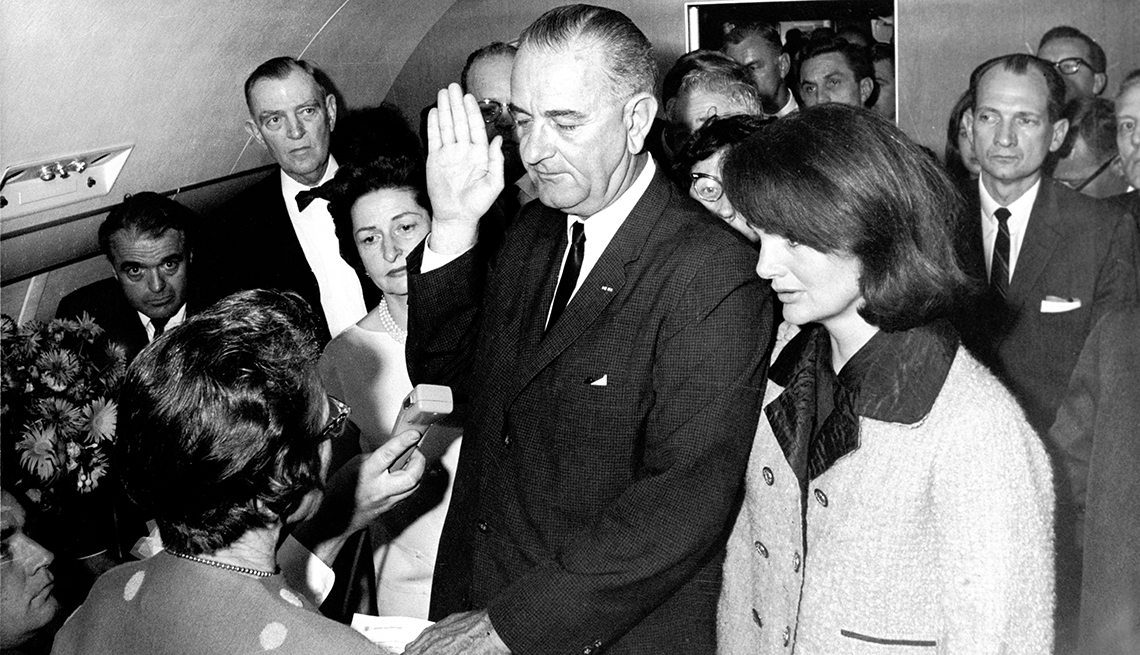
50th anniversary: 1963 was a year with lasting impact
- Select a language for the TTS:
- UK English Female
- UK English Male
- US English Female
- US English Male
- Australian Female
- Australian Male
- Language selected: (auto detect) - EN
Play all audios:

* Courtesy of Clemson University JAN. 28: CHALLENGING SEGREGATION En español | Harvey Gantt, the first African American student admitted to South Carolina's Clemson University, begins
classes. Gantt went on to graduate with honors and later earned a master's degree in city planning from MIT. In 1983 he was elected to his first of two terms as mayor of Charlotte, N.C.
1 of 14 * The Granger Collection FEB. 19: WOMEN'S RIGHTS _The Feminine Mystique_, a book examining women's lives in the decades after World War II, is published — and widely
credited with igniting the women's liberation movement. First-time author Betty Friedan went on to cofound and lead the National Organization for Women. 2 of 14 * Bettmann/Corbis MARCH
22: THE BEATLES! George, John, Paul and Ringo (as pictured at left) release _Please Please Me_, in the U.K. Their debut album — which includes such classics as "I Saw Her Standing
There" and the group's cover of "Twist and Shout" — was renamed_ Introducing ... the Beatles_ for its U.S. release a year later. 3 of 14 * Justin Lane/EPA/Corbis APRIL
16: FIGHTING INJUSTICE After being jailed for disobeying a state court injunction against public protests, Martin Luther King Jr. writes his "Letter From a Birmingham Jail"
(versions of which are shown at left). It is in this letter that King famously declares, "Injustice anywhere is a threat to justice everywhere." 4 of 14 * MGM/UA/Photofest MAY 8:
BOND, JAMES BOND _Dr. No_, the first film based on novelist Ian Fleming's James Bond series, opens in the U.S. after having debuted in the U.K. the year before. Sean Connery is the
first actor to play Agent 007. Twenty-three Bond films — with Connery or five other actors in the lead role — have followed. 5 of 14 * David J. & Janice L. Frent Collection/Corbis JUNE
10: PAY EQUITY The Equal Pay Act, mandating equal pay (despite gender) for equal work, is signed into law. Women's relative pay would increase but still doesn't match that of men.
In 2009, to further protect women from pay inequity, President Obama signed the Lilly Ledbetter Fair Pay Act. 6 of 14 * AP Photo JUNE 11: BRAVING DISCRIMINATION Standing in a doorway,
Alabama Gov. George Wallace blocks the enrollment of Vivian Malone and James Hood as the first African American students at the University of Alabama. Wallace steps aside only after
President John F. Kennedy mobilizes National Guard troops to the scene. 7 of 14 * Charles Gorry/AP Photo JUNE 11: PROTECTING BASIC RIGHTS On the same day as the standoff in Alabama, JFK
delivers an address asking Congress to enact legislation protecting the right of all Americans to be served in facilities that are open to the public. "This seems to me to be an
elementary right," he says. The Civil Rights Act became law in 1964. 8 of 14 * Time & Life Pictures/Getty Image AUG. 5: LIMITING NUKES The U.S., U.K. and Soviet Union sign the
Limited Nuclear Test Ban Treaty, one day before the 18th anniversary of the U.S. bombing of Hiroshima at the end of World War II. The treaty aims to slow the arms race and limit the effect
of nuclear testing on the atmosphere and environment. 9 of 14 * Jim Bourdier/AP Photo AUG. 18: ACHIEVING OVER HATE James Meredith, whose 1962 entry into the previously segregated University
of Mississippi sparked a student riot, graduates with a degree in political science. Meredith later earned a law degree from New York's Columbia University and pursued a career in
Republican politics. 10 of 14 * Francis Miller/Time Life Pictures/Getty Images AUG. 28: MARCHING ON WASHINGTON Martin Luther King Jr. makes his "I Have a Dream" speech from the
steps of the Lincoln Memorial before a crowd of about 250,000. The civil rights movement's March on Washington pressured Congress to pass a bill granting equal opportunity and an end to
segregation and discrimination. 11 of 14 * AP Photo SEPT. 15: VIOLENCE IN BIRMINGHAM The Ku Klux Klan bombs the 16th Street Baptist Church, an African American congregation in Birmingham,
Ala., and a meeting place for civil rights leaders at the time. The blast kills four young girls, all under the age of 15. The church remains open today. 12 of 14 * John D. Kisch/Separate
Cinema Archive/Getty Images OCT. 1: AND THE WINNER IS ... _Lilies of the Field_, starring Sidney Poitier as a handyman who helps a group of nuns build a chapel, opens in theaters. Poitier
became the first African American to win the Academy Award for best actor for his performance in the film. 13 of 14 * Universal History Archive/Getty Images NOV. 22: JFK KILLED President
John F. Kennedy is assassinated while riding in a motorcade through Dallas. Aboard Air Force One at Dallas' Love Field, Vice President Lyndon B. Johnson is sworn in as the new U.S.
president. Two days later, Lee Harvey Oswald, the accused assassin, was murdered by Jack Ruby. 14 of 14
